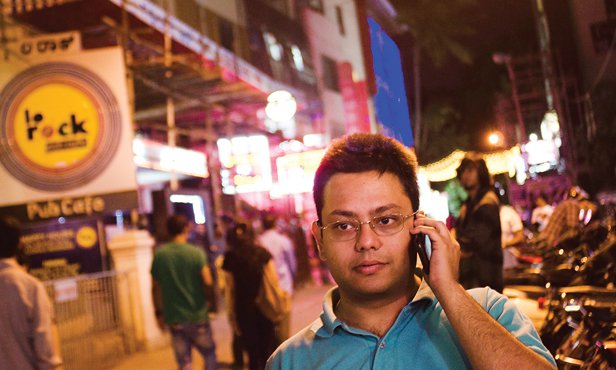Saikat Guha is convinced that privacy and profit don’t have to conflict online. The Microsoft Research India computer scientist has developed a software platform that allows advertisers to precisely target potential customers without exposing the customers’ personal information.
The trick involves flipping the basic model of targeted advertising. Companies now track your browsing and purchasing behavior and then sell your data to advertisers. But instead of acquiring data from your phone or PC so that companies can send the right ads to websites you visit, Guha’s system calls for companies to send potential ads to you; then software on your device figures out which of them are targeted effectively. Thus, if you search for video games, the software will fetch entertainment-related ads. If your computer or phone recognizes that, say, you often buy DVDs, the device will pick out a DVD ad to show you. Guha’s ad-selecting software could be built into browsers, or into websites such as Facebook. And he estimates that the ads wouldn’t take up significant amounts of memory on your machine.
Since companies wouldn’t be able to see or store your data or toss it around the Web, risking accidental leakage, even data normally too private to share with advertisers could be brought to bear in picking from among them.
Today, for instance, Google can’t determine your birth date unless you offer it up. But Guha’s software might come across it on your PC and use it to enhance the targeting of Google’s ad network, without ever revealing the date to Google. It’s a privacy protection scheme that, unlike almost all others, indirectly gives businesses an even richer set of data to work with.
Guha has also addressed the privacy threat from smartphone apps that package and sell sensitive information such as a user’s name and location. “Today someone could construct a full history of where you are at any given time of the day,” he says. His idea is a platform that cryptographically splits information such as a person’s name, the name of the store the person is visiting, and the amount of time spent at the previous store into disconnected fragments before sending it to the cloud. Software on the phone or tablet could then use all or most of those fragments to target advertisements, but no party involved could connect them to create a privacy-violating portrait of the user.
There will always be those who will try to get around privacy protection schemes to scope out more about you than you care to share. Guha is on top of that problem, too. He’s working on algorithms that detect when websites and apps are surreptitiously using your personal data, so you can block them.
—Prachi Patel




